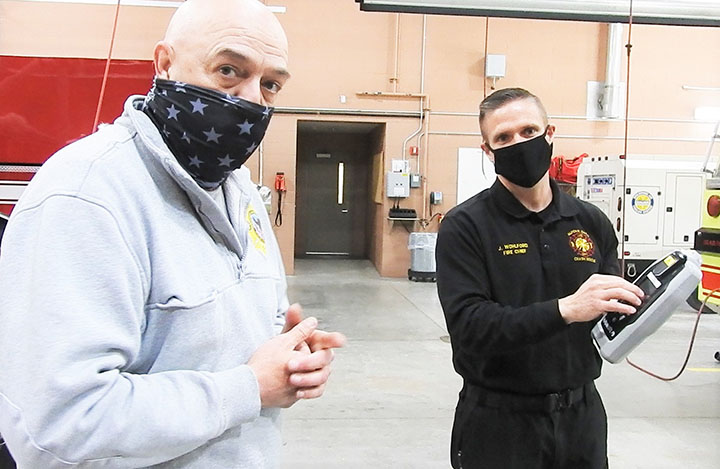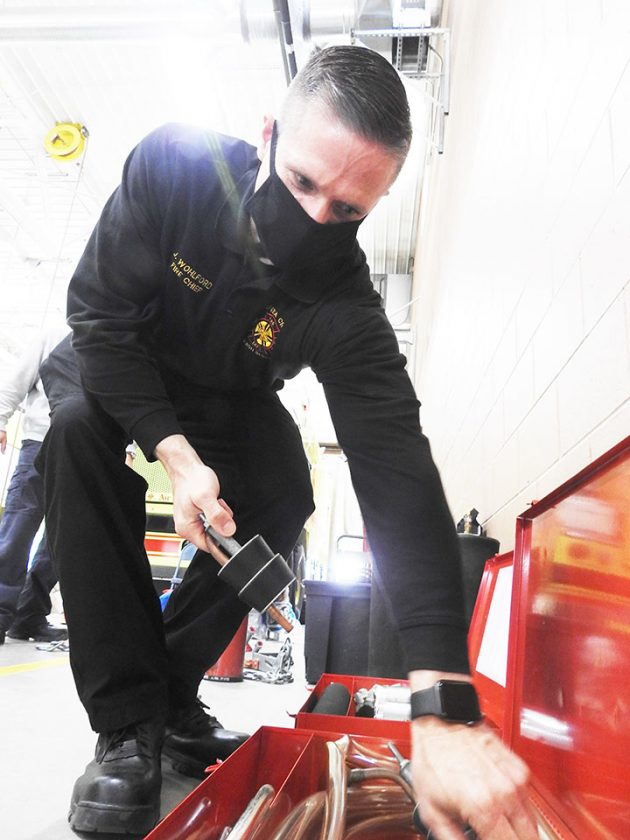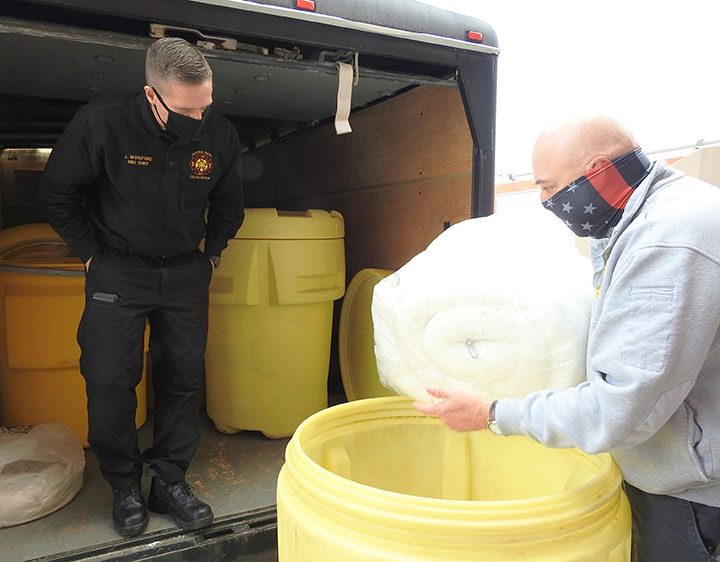
By Julie Riddle, The Alpena News
This article is part of a collaboration between The Alpena News and Great Lakes Now at Detroit Public Television to bring audiences stories about the Great Lakes, especially Lake Huron and its watershed.
ALPENA — If an oil spill oozed its way to Thunder Bay and onto the shores of Alpena, local responders wouldn’t have the needed equipment on hand to stop it.
Northeast Michigan does have at its disposal, however, a well-stocked military base, state and federal disaster response agencies, and the power of teamwork, planning, and community-mindedness, officials said.
While the likelihood of an oil spill making its way from the Enbridge Inc.-owned Line 5 pipeline under the Straits of Mackinac to Alpena is relatively low — with only a 5% chance an oil spill of 25,000 barrels would reach Thunder Bay, according to a 2016 study — the city faces the risk of large-scale emergencies of other kinds, from tipped fuel trucks to train fires to downed airplanes.
Local emergency responders train to know what to do if such an event occurs, and they know where to get the physical resources to do the job, according to Mark Hall, emergency services coordinator for Alpena County.
Spill response tools and other equipment, housed at the Alpena Combat Readiness Training Center, set Northeast Michigan ahead of other counties in emergency preparedness and promise a quick response if a crisis arises, CRTC officials said.
“The reality is, whatever happens, we’re going to have to handle,” Hall said. “We either have the assets on hand, or we’ll get ’em.”
Related stories on Great Lakes Now:
Michigan vows to seek Line 5 profits if Enbridge defies shutdown order
As Line 5 debate continues, residents weigh risks to shorelines, economies
‘Are you ready for this?’

At the Alpena Combat Readiness Training Center last month, Fire Chief Senior Master Sgt. Jeremy Wohlford, Alpena Combat Readiness Training Center fire chief, reaches into a kit filled with supplies for stopping a leak in a tank of hazardous liquids. (Photo by Julie Riddle/The Alpena News)
While Alpena responders have ready access to equipment for emergencies common to a northern Great Lakes town — boats in distress, diving accidents, and ice rescues, for example — their tools would fall short in the event of a larger, less-predictable emergency, Hall said.
If an oil leak, from Line 5 or another source, made its way to Alpena, the U.S. Coast Guard, with jurisdiction over the Great Lakes waters, would take command, Hall said.
City and township fire departments have containment booms — floating absorbant barriers designed to contain oil spills — and a few other water-protection tools on hand, but nowhere near the number needed to fight a large spill.
The Coast Guard station responsible for Northeast Michigan, located in Sault Ste. Marie, has access to more than 7,000 feet of booms, with another 30,000 feet accessible from Canadian colleagues, according to a 2018 risk analysis provided by Michigan Technological University.
Hall could call multiple state and federal agencies for backup assistance, he said.
In large-scale emergencies, representatives from police, fire, medical, and other emergency teams form a unified command, combining strengths and resources of each member and preparing emergency protocol “so we’re all singing from the same page,” Hall said.
Alpena County could face major emergencies other than an oil-based disaster, according to Alpena County Undersheriff Erik Smith.
“We have big trucks that drive through and big trains that pass through, and who knows what’s on them?” Smith said.
U.S.-23 runs through the heart of Alpena, as well as through residential and agricultural areas. Several Alpena businesses, from Lafarge North America to corner gas stations, use the highway to transport dangerous liquids in trucks susceptible to rollover or puncture.
Dams could fail, natural gas wells could explode, or airplanes could crash, even in Alpena, Smith said.
“They don’t call us and say, ‘Are you ready for this?’” Smith said.

At the Alpena Combat Readiness Training Center last month, Fire Chief Senior Master Sgt. Jeremy Wohlford, left, and Vince Cammack, CRTC assistant chief of operations, display coils of absorbent boom used to stop oil spills. (Photo by Julie Riddle/The Alpena News)
A lot of tools
The Alpena Combat Readiness Training Center serves as the area’s primary provider of disaster response tools and expertise.
With limited budgets, local fire departments have no chance of paying for the type of equipment available on the base, according to Vince Cammack, assistant chief of operations at the CRTC fire department.
“Uncle Sam says we have to do it,” Cammack said. “Alpena doesn’t have to worry about it, now.”
All members of the CRTC fire department have completed required training as technicians able to handle hazardous material directly, according to Senior Master Sgt. Jeremy Wohlford, CRTC fire chief.
The CRTC fire department building houses trailers packed with carefully stored and clearly labeled rubber coveralls, tank repair tools, decontamination tents, and other safety equipment.
Large, watertight drums fill one trailer, along with spill pads and booms to contain oil spills, such as the leakage when a boat sank in the Rockport State Recreation Area harbor some years back. Responders captured that fuel in the harbor, before it reached Lake Huron, Wohlford said.
Hand-held devices that detect dangerous chemicals — one worth $50,000 and another worth $80,000, according to Wohlford — allow responders to identify and know how to respond to even a single molecule of a hazardous substance. The devices assess such threats as explosives, drug labs, and chemical attacks.
CRTC officials purchase the equipment with the needs of the base in mind, but collaboration with area responders widens the reach of both the base’s equipment and its personnel, as seen last year when CRTC firefighters helped battle a structure fire at the historic John A. Lau Saloon in downtown Alpena.
The CRTC resources that greatly expand the region’s preparedness — an advantage not shared by many communities — do not prepare it for every circumstance, Wohlford said.
“We have a lot of tools to fix a lot of things,” however, the fire chief said.
A few years ago, he remembered, a barrel fell off of a ship and floated into the Alpena harbor.
When someone opened the barrel, people started getting sick. Though that exact scenario may not have crossed anyone’s mind beforehand, esponders from CRTC put the barrel inside a drum, decontaminated everybody, and stopped the situation from getting worse.
“You can’t pre-plan everything that’s out there,” Wohlford said. “You just can’t.”
Catch more news on Great Lakes Now:
As Line 5 debate continues, residents weigh risks to shorelines, economies
Is the Line 5 tunnel a bridge to Michigan’s energy future or a bad deal?
On eve of Line 5 shutdown deadline, Enbridge vows to defy Michigan order
Featured image: At the Alpena Combat Readiness Training Center last month, Senior Master Sgt. Jeremy Wohlford, right, CRTC fire chief, holds a $50,000 monitor that uses laser technology to identify dangerous chemicals as Vince Cammack, CRTC assistant chief of operations, explains its use. (Photo by Julie Riddle/The Alpena News)
"help" - Google News
May 12, 2021 at 10:54PM
https://ift.tt/3bq0rzj
Outside help available for oil spill, other large-scale emergencies – Great Lakes Now - Great Lakes Now
"help" - Google News
https://ift.tt/2SmRddm
Bagikan Berita Ini














0 Response to "Outside help available for oil spill, other large-scale emergencies – Great Lakes Now - Great Lakes Now"
Post a Comment